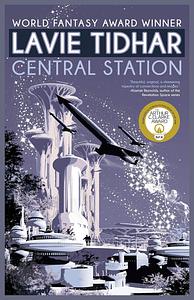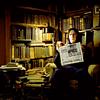Take a photo of a barcode or cover
reflective
medium-paced
The immersive quality of the visual textures and the aural soundscape of a culturally diverse diasporic future in Central Station really rang true for me.
Cont'd on the blog: https://paperwanderer.wordpress.com/2016/05/27/central-station-by-lavie-tidhar/
Cont'd on the blog: https://paperwanderer.wordpress.com/2016/05/27/central-station-by-lavie-tidhar/
It's not easy to write Sci-Fi about Israel, where you barely know what's going to happen tomorrow let alone predict the future.
But one thing that has been a constant is the Arab Israeli Conflict. Tidhar gets past the elephant in the room by solving it and leaving it in the past. Even the vets don't remember which side they were on.
This is a bit of a copout, but it leaves Tidhar free to pursue other dimensions rather than the obvious.
On the other hand this did leave me feeling that apart from allot of name dropping of locations and Israeli dictionary terms such as Kibbutzim, this story could have taken place in the slums of any large city that attracts migrants. We hardly get to meet any characters from Tel-Aviv or Jaffa and those we do have no depth to them.
This is a collection of short stories and it shows with lots of repetition of background information that you read just a few pages ago in a previous section. I wonder why this couldn't be edited out when combining the stories into a book.
I work in Tel-Aviv, I go through Central Station a number of times a week, thought these days I use the nearby Ha'hagana train station and don't actually enter the station building. My work place used to be on one of the streets near the Station though it is not named in the book.
I teach blind people how to use computers and smartphones. These days we've moved to a more lucrative location in north Tel-Aviv, but many of my students still come from southern Tel-Aviv. The relations between the old residence of the Central Station area and the migrants is complicated and involves allot of fear resentment and bigotry. However many Israelis aid the migrants. Last year I taught a blind Philipinian migrant girl how to use an iPhone that was donated by someone from Tel-Aviv. I donated my teaching time because our mandate is to teach seniors not children.
As it turned out the social worker that helped get the iPhone donation forgot to ask for enough money to also buy a case. We needed an extra 100$ to get a good Otterbox to protect the expensive assistive technology. Sitting at a table at my Kibbutz's dining room it took me just a couple of minutes telling her story to three of my friends, in order to get them to pitch in and we got her the case.
Why am I telling you all this? Because I would have liked to see a more complex future Israel in this book.
But one thing that has been a constant is the Arab Israeli Conflict. Tidhar gets past the elephant in the room by solving it and leaving it in the past. Even the vets don't remember which side they were on.
This is a bit of a copout, but it leaves Tidhar free to pursue other dimensions rather than the obvious.
On the other hand this did leave me feeling that apart from allot of name dropping of locations and Israeli dictionary terms such as Kibbutzim, this story could have taken place in the slums of any large city that attracts migrants. We hardly get to meet any characters from Tel-Aviv or Jaffa and those we do have no depth to them.
This is a collection of short stories and it shows with lots of repetition of background information that you read just a few pages ago in a previous section. I wonder why this couldn't be edited out when combining the stories into a book.
I work in Tel-Aviv, I go through Central Station a number of times a week, thought these days I use the nearby Ha'hagana train station and don't actually enter the station building. My work place used to be on one of the streets near the Station though it is not named in the book.
I teach blind people how to use computers and smartphones. These days we've moved to a more lucrative location in north Tel-Aviv, but many of my students still come from southern Tel-Aviv. The relations between the old residence of the Central Station area and the migrants is complicated and involves allot of fear resentment and bigotry. However many Israelis aid the migrants. Last year I taught a blind Philipinian migrant girl how to use an iPhone that was donated by someone from Tel-Aviv. I donated my teaching time because our mandate is to teach seniors not children.
As it turned out the social worker that helped get the iPhone donation forgot to ask for enough money to also buy a case. We needed an extra 100$ to get a good Otterbox to protect the expensive assistive technology. Sitting at a table at my Kibbutz's dining room it took me just a couple of minutes telling her story to three of my friends, in order to get them to pitch in and we got her the case.
Why am I telling you all this? Because I would have liked to see a more complex future Israel in this book.
The latest novel by World Fantasy Award–winning author Lavie Tidhar, Central Station is a chunk of a literary speculative novel set in a future Tel Aviv, in the titanic shadow of the eponymous Central Station, the earth-side terminus of the route to the rest of the solar system.
Switching between multiple perspective characters, it flashes back to the past and returns to the present to tell, in a broad, looping fashion, the story of the people of Central Station and, in particular, the lab-grown children of the city and their unsettling techno-magic.
Central Station is a liminal place. It’s where earth meets space. Nestled in the massive structure are the immersion pods where people go to enter gameworlds, virtual universes every bit as important as the ‘real’ one. In the shadow of the station, robotniks beg—crude machine-people hybrids, built for war and abandoned to peacetime. And here too, Isobel Chow, a perfectly human girl, meets her robotnik lover.
Central Station is where worlds touch. Like an enormous pin, it tacks together concepts the humans in the novel frequently consider opposite. The terrestrial and the interplanetary, the real and the virtual, the human and the technological. Likewise, it sits in between Israeli Tel Aviv and Arab Jaffa, pinning them together.
Tidhar’s setting is utopian in this respect. In the Middle East of Central Station, war is a thing of the past, almost forgotten. Homophobia, racism and misogyny are nowhere to be seen. The future has overtaken hatred.
Memory is another feature of the novel. One thread follows three members of the large and cursed Chong family—cursed by an ancestor’s wish for his descendants never to forget who they are and where they come from. Another character is infected with a technological curse, compelling her to devour memory, data, like a vampire, as if it were life itself.
Which of course it is. Though memory overwhelms the Chongs, though the hunger for it torments the data vampire Carmel, the only disconnected character in this novel is a sad figure. Un-noded and therefore cut off from the Conversation—the wireless connection in which everyone moves like air—he collects paper books, now rare and curious relics. Surrounded by the fiction of the past, Achimwene is still lonely.
As the story of the Chongs illustrates, memory is belonging. Central Station, the novel, is a loose kind of saga. It’s a story—or many stories—about family. Not only blood, but love: romantic and otherwise. It’s about all the strange kinds of bonds that tie people together, in the present and across the years. It’s a story about muddling along together, all the disparate stories interlinking, all the opposites mingling, making a greater whole. A greater future.
Switching between multiple perspective characters, it flashes back to the past and returns to the present to tell, in a broad, looping fashion, the story of the people of Central Station and, in particular, the lab-grown children of the city and their unsettling techno-magic.
Central Station is a liminal place. It’s where earth meets space. Nestled in the massive structure are the immersion pods where people go to enter gameworlds, virtual universes every bit as important as the ‘real’ one. In the shadow of the station, robotniks beg—crude machine-people hybrids, built for war and abandoned to peacetime. And here too, Isobel Chow, a perfectly human girl, meets her robotnik lover.
Central Station is where worlds touch. Like an enormous pin, it tacks together concepts the humans in the novel frequently consider opposite. The terrestrial and the interplanetary, the real and the virtual, the human and the technological. Likewise, it sits in between Israeli Tel Aviv and Arab Jaffa, pinning them together.
Tidhar’s setting is utopian in this respect. In the Middle East of Central Station, war is a thing of the past, almost forgotten. Homophobia, racism and misogyny are nowhere to be seen. The future has overtaken hatred.
Memory is another feature of the novel. One thread follows three members of the large and cursed Chong family—cursed by an ancestor’s wish for his descendants never to forget who they are and where they come from. Another character is infected with a technological curse, compelling her to devour memory, data, like a vampire, as if it were life itself.
Which of course it is. Though memory overwhelms the Chongs, though the hunger for it torments the data vampire Carmel, the only disconnected character in this novel is a sad figure. Un-noded and therefore cut off from the Conversation—the wireless connection in which everyone moves like air—he collects paper books, now rare and curious relics. Surrounded by the fiction of the past, Achimwene is still lonely.
As the story of the Chongs illustrates, memory is belonging. Central Station, the novel, is a loose kind of saga. It’s a story—or many stories—about family. Not only blood, but love: romantic and otherwise. It’s about all the strange kinds of bonds that tie people together, in the present and across the years. It’s a story about muddling along together, all the disparate stories interlinking, all the opposites mingling, making a greater whole. A greater future.
Gorgeous book overall. Very happy to have taken a chance on it! Too much comes to mind as praise for this book--and I don't even read much sci-fi.
The writing:
* Tidhar has a wonderful ability to pick me up, drop me in an unfamiliar, futuristic Tel Aviv, give me delicious hints about the setting using smell, space, color and texture. Though it is the future, it is clear.
* The same goes for character-building. The first third of the book introduced me to a variety of extremely unique characters of races of which I didn't fully comprehend the origins; yet, as the book progresses, these characters are clearly intertwined, their histories divulged, and their present lives made sense of.
* I loved the use of space (on the page) between characters, between their memories, between their experiences. It broke up what could have been long swaths of potentially-confusing description/ internal dialogue into bite-sized chunks of character sketch and plot.
The story (potential spoilers):
* The first third of the book was dedicated more to character and setting building, and the history of Central Station. This same style (of information divulging) continues throughout the book, and climaxes at the end with a number of realizations.
* Pacing: In hindsight, the first third of the book was the "slowest" of the thirds, but moved at a normal rate by comparison of other texts. The second and third pieces moved quickly by comparison once the relationships and emotions between characters are more fully understood. Here, the plot is allowed to flow freely and quickly.
Gorgeous book overall. Very happy to have taken a chance on it!
The writing:
* Tidhar has a wonderful ability to pick me up, drop me in an unfamiliar, futuristic Tel Aviv, give me delicious hints about the setting using smell, space, color and texture. Though it is the future, it is clear.
* The same goes for character-building. The first third of the book introduced me to a variety of extremely unique characters of races of which I didn't fully comprehend the origins; yet, as the book progresses, these characters are clearly intertwined, their histories divulged, and their present lives made sense of.
* I loved the use of space (on the page) between characters, between their memories, between their experiences. It broke up what could have been long swaths of potentially-confusing description/ internal dialogue into bite-sized chunks of character sketch and plot.
The story (potential spoilers):
* The first third of the book was dedicated more to character and setting building, and the history of Central Station. This same style (of information divulging) continues throughout the book, and climaxes at the end with a number of realizations.
* Pacing: In hindsight, the first third of the book was the "slowest" of the thirds, but moved at a normal rate by comparison of other texts. The second and third pieces moved quickly by comparison once the relationships and emotions between characters are more fully understood. Here, the plot is allowed to flow freely and quickly.
Gorgeous book overall. Very happy to have taken a chance on it!
lighthearted
fast-paced
Strong character development:
No
Loveable characters:
Complicated
Diverse cast of characters:
Yes
Flaws of characters a main focus:
No
I liked that this was science fiction not centered on US/Western Europe. It's set in a very vividly imagined Tel Aviv with street food and art and mingled ethnicities.
I felt like I was going to like this when I began. The book raises so many questions about identity in a world of almost complete digital interconnectedness, about who is human and who isn't, about how people find meaning and the place of religion in that quest---but I'm afraid somehow by the middle or so the author and I were apparently on separate tracks and missed each other in the night. I'll keep an eye out for future work, though, and try one again.
i'm sure that i didn't catch a bunch of stuff that happened like...Kranki and Ishmail and what they are or the Oracle probably but i was deeply engaged in the future world although i would have loved to know what the rest of the world was up to in this time.
Full disclosure: I helped edit this book. Heck, I wrote the descriptive copy (so there goes any further plot summarizing - no spoilers!). BUT, I guarantee that you've never read anything like Central Station, and you need to pick it up to see what science fiction can truly be: international, multicultural, lyrical, and thought-provoking. I mean, NPR described Central Station as "brilliant." Everyone loves NPR, amirite?





